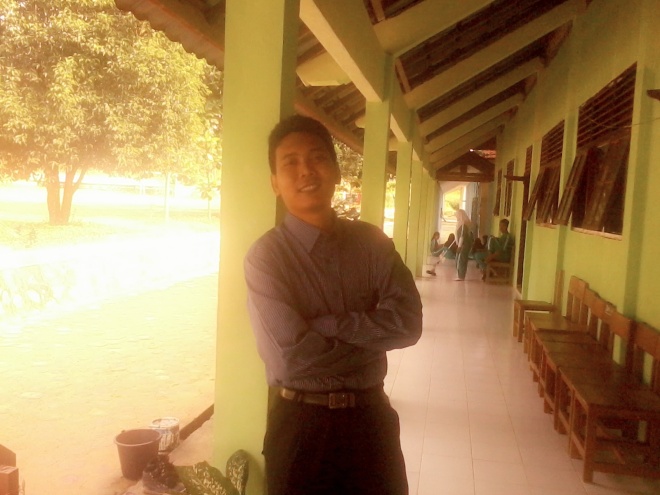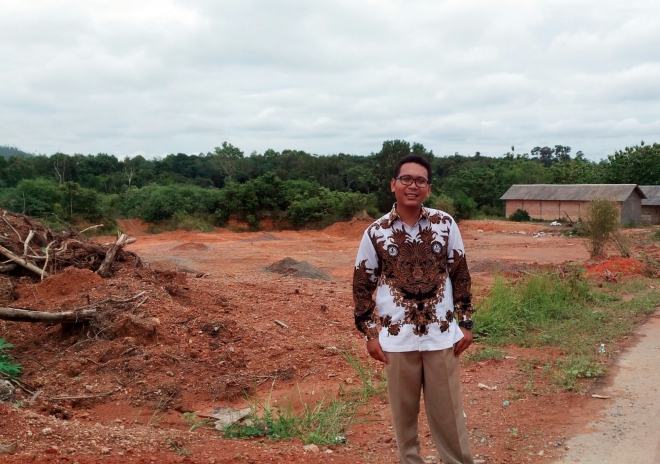Sebenarnya saya ragu untuk menulis artikel ini. Sedikit khawatir bila tulisan ini akan menuai kontraversi seperti jambul Khatulistiwanya Syahrini, karena artikel yang akan saya angkat menyangkut adat-istiadat masyarakat luas di daerah tempat tinggal saya. Setelah saya mempertimbangkan lebih lanjut, saya harus menulis artikel ini dengan berbagai sudut pandang yang berbeda. Sebab pada hakikatnya segala sesuatu hal senantiasa memiliki dua sisi yang bertolak belakang: baik dan buruk, positif dan negatif, menguntungkan dan merugikan.
Masyarakat di daerah barat daya provinsi Kalimantan Tengah mengenal budaya pus-am sejak zaman nenek moyang mereka menempati wilayah tersebut yang meliputi kabupaten Sukamara, kabupaten Lamandau, dan sebagian kabupaten Kotawaringin Barat. Ada pula masyarakat di wilayah selatan kabupaten Ketapang yang terletak di provinsi Kalimantan Barat. Lalu, apakah yang dimaksud dengan budaya pus am itu?
Lebih tepatnya pus am atau kerap juga dilafalkan pusam dalam aksen cepat, adalah suatu kebiasaan masyarakat di wilayah yang telah saya sebutkan di atas, di mana mereka enggan memedulikan suatu persoalan yang mungkin dianggap penting oleh lawan bicaranya. Secara harfiah pus dapat diartikan ‘biar saja’ dalam bahasa Indonesia. Akan tetapi masyarakat cenderung mengartikannya sebagai suatu ungkapan yang berarti ‘masak bodoh’. Masyarakat di perbatasan Kalbar dan Kalteng seringkali melafalkannya, “pus am!” atau “pus am bah!” dengan intonasi meninggi pada kata ‘am’ dan memanjang pada pengucapan kata ‘bah’ menjadi ‘baaah!’
Kata ‘am’ dan ‘bah’ itu sendiri tidak memiliki makna yang berarti. Kedua kata tersebut hanya menjadi penghias kalimat, atau penekan kalimat yang mengindikasikan kasar-halusnya suatu pengucapan. Bunyi ucapan tersebut memang tidak nyaman didengar dan terkesan kasar. Akan tetapi kebiasaan mengucapkan kata-kata pus am telah mendarah daging di masyarakat sehingga menjadi tradisi. Saya kerap dibuat jengkel tatkala mendengar seseorang mengatakan pus am kepada saya. Seringnya saya mendengar kata-kata tersebut akhirnya saya menjadi terbiasa dan bersikap sabar ketika menyikapinya. Beberapa kejadian tidak menyenangkan yang pernah saya alami dengan budaya pus am antara lain sebagai berikut:
Pertama, waktu itu saya baru menjadi seorang guru di sebuah SMA. Murid-murid saya tidak berpakaian rapi layaknya pelajar. Dan saya menegur mereka, “Tolong dimasukkan pakaiannya ya, supaya kelihatan rapi!” Namun mereka membalas ucapan saya dengan pernyataan, “Pus am, Pak! Apa guna rapi-rapi?” sambil berlalu meninggalkan saya tanpa mengindahkan teguran saya. Melihat hal itu, saya hanya menggeleng-geleng kepala.
Kedua, pernah suatu ketika saya menyuruh salah seorang siswa untuk menjenguk temannya yang beberapa hari tidak masuk sekolah. “Sudah beberapa hari Rafta tidak masuk sekolah, bisakah kamu mampir ke rumahnya sepulang sekolah nanti? Barangkali dia sakit,” pinta saya waktu itu. Tak disangka jawaban murid yang saya mintai tolong itu seperti ini, “Pus am bah! Apa guna juga menjenguk dia? Biar ja amun dia sakit.” Ujarnya dengan nada datar. Mulut saya ternganga mendengar jawaban tersebut. Apakah dia tidak memiliki solidaritas, pikir saya.
Ketiga, saat sedang ujian berlangsung salah seorang siswa tak kunjung mengisi lembar jawabannya. Sementara waktu ujian akan segera habis. Secara kebetulan saya sedang mengawas. Tentu saja begitu saya melihat kejadian itu, saya langsung menegur siswa yang bersangkutan. “Tolong lembar jawabanmu segera diisi, karena waktu ujian sudah mau habis. Maaf, saya tidak bisa memberi perpanjangan waktu untuk itu,” ucap saya dengan hati-hati. Lagi, mata saya harus membelalak lebar mendengar tanggapan si empu kertas. “Alah, pus am bah, Pak! Mau waktunya habiskah, mau diperpanjangkah nggak urus. Biar nggak dapat nilai juga!”
Saya tidak habis pikir mengapa orang-orang di daerah tempat tinggal saya memiliki pola pikir yang begitu pendek. Mereka tidak mau memedulikan apa yang orang lain khawatirkan meskipun hal tersebut berkaitan erat hubungannya dengan mereka.
Kejadian lain yang pernah saya alami, suatu hari saya melihat seorang anak balita kira-kira berusia dua tahun berjalan kaki mengikuti ibunya keluar masuk hutan untuk mencari rebung. Panas matahari begitu terik, bocah itu tidak mengenakan alas kaki sama sekali. Bocah itu meraung-raung kesakitan sambil terus mengejar sang ibu yang berjalan jauh di depan. Saya tidak tega melihatnya, apalagi kaki si bocah dipenuhi luka parut akibat bergesekan dengan semak berduri dan ranting pepohonan yang tidak bersahabat dengannya. “Aduh Bu, ini anaknya kasihan luka-luka. Ayo saya antar ke puskesmas,” tawar saya seraya menggendong si bocah. Sang ibu dengan sikap acuh tak acuh, hanya menoleh ke arah saya sekilas kemudian melanjutkan langkahnya jauh ke dalam hutan. “Pus am, Pak! Suruh dia jalan lagi!” teriaknya tiba-tiba dari kejauhan. Ya, saya maklum penduduk lokal memang terbiasa berjalan tanpa alas kaki. Karena itulah mereka memiliki fisik yang sangat kuat. Tapi untuk anak seusia itu? Terlalu dini rasanya. Atau jiwa saya yang terlalu lembut?
Di lain waktu pernah pula seorang teman meminjam beberapa barang milik saya antara lain jam tangan, jaket, dan sepatu. Entah disengaja atau tidak, semua barang yang dipinjam oleh teman saya itu ditinggalkannya di kamar hotel ketika ia berjalan-jalan ke kota dengan kekasihnya. Setelah saya memintanya untuk mengembalikan barang-barang tersebut, dengan enteng teman saya ini menjawab, “Pus am bah! Ambil aja sendiri ke hotel sana!” Grr… Benar-benar menjengkelkan punya teman seperti itu.
Ada banyak sekali kejadian berujung pus am yang saya alami. Kebanyakan pus am-pus am itu lebih bermakna ‘Sorry ya, aku nggak peduli’. Sampai akhirnya saya memahami mengapa tradisi pus am telah mendarah daging di masyarakat sejak zaman bahari. Konon dahulu kala di pedalaman pulau Kalimantan pada masa kolonialisme dan imperialisme bangsa barat, para kompeni tidak pernah sampai ke area pedalaman. Sehingga penduduk di pedalaman tidak terlalu menderita seperti halnya penduduk di kota yang notabene banyak mengalami penyiksaan. Penduduk pedalaman berjiwa bebas. Mereka berperang bukan untuk melawan penjajah, melainkan suku lain yang dianggap musuh oleh suku mereka. Begitu negara Indonesia merdeka dan pulau Kalimantan masuk ke dalam wilayah NKRI, penduduk di pedalaman tidak begitu mengerti makna sebuah kemerdekaan. Mereka kurang menjiwai nilai-nilai luhur yang terkandung dalam Pancasila seperti tenggang rasa, toleransi, musyawarah, dan jiwa nasionalisme. Saking kurang memahaminya, pernah saya mengunjungi suatu dusun di pelosok Kalbar pada bulan Agustus untuk melihat perayaan dirgahayu RI di sana. Setibanya di sana saya sangat kaget, karena saya merasa tiba-tiba bukan berada di negara sendiri. Sepertinya saya sudah tersesat ke Republik Polandia. Karena apa? Sang saka merah putih dikibarkan terbalik di setiap halaman rumah para penduduk dusun. Saat saya memberitahu warga bahwa pemasangan bendera di dusun mereka semua terbalik, lagi-lagi warga hanya menanggapi perkataan saya dengan kata, “Pus am!”
Apa saya terus tinggal diam menyikapi orang-orang di sekitar saya untuk melestarikan budaya pus am? Awalnya saya maklum, dan hanya bisa menerima perlakuan yang tidak mengenakkan ini secara sepihak. Seiring bergulirnya waktu akhirnya saya mencoba untuk menentangnya. Tentu saja bukan dengan cara yang ekstrim dan anarkis. Cara saya adalah menempatkan diri saya sebagai bintang drama Korea. Haha… mungkin ini lucu kedengarannya. Silakan Anda baca kembali cerita kejadian-kejadian yang telah saya alami di atas. Bayangkan kalau Anda sedang menyaksikan adegan drama Korea di mana para tokoh-tokohnya sedang cekcok satu sama lain.
Setiap ada murid yang penampilannya tidak rapi, saya tetap menegur mereka untuk merapikannya tak peduli bila mereka mengatakan pus am kepada saya. Bila mereka tak mengindahkan perkataan saya, maka aksi drama Korea saya adalah menghalangi langkah mereka sebelum mereka berlalu meninggalkan saya. “Hey, biar saya saja yang merapikan pakaian kalian! Orang tua kalian tidak pernah mengajari bagaimana cara berdandan ya? Ayo, sini saya ajarkan sekalian! Penampilan saya sepuluh kali lebih rapi daripada Lee Min Ho. Kalian tahu itu?” Sengit saya seraya bergerak menghampiri mereka.
Setiap kali melihat murid yang tidak peduli terhadap keadaan temannya, saya membujuk mereka dari hati ke hati, “Ayolah, kalian tidak sedang putus cinta kan? Apa kamu tahu kalau dia selama ini sebenarnya sangat perhatian terhadapmu? Kamu pasti tidak tahu kan seberapa besar pengorbanan yang telah dia lakukan selama ini untukmu? Jadi, saya mohon jenguklah dia di rumahnya. Dia pasti akan sembuh setelah melihat kedatanganmu! Ayo, kita jenguk dia sama-sama!”
Dan setiap kali saya mendapati teman yang tidak bertanggung jawab atas barang-barang yang mereka pinjam dari saya, maka aksi drama Korea saya selanjutnya adalah: “Bisa tolong tunjukkan kartu identitasmu? Silakan tunggu sebentar, tidak lama lagi polisi akan tiba di sini. Baru saja saya melaporkan kalau ada anggota teroris yang mengidap penyakit demensia di sini.”
Haha… Ini konyol sekali, kan? Mungkin ini terlalu frontal. Akan tetapi memang demikianlah karakteristik penduduk di daerah saya. Karakter mereka tidak berbeda dengan karakter orang Korea dalam drama. Saat seseorang bersikap frontal terhadap kita, maka cara jitu yang bisa mengatasinya adalah membalas tindakan secara frontal kembali. Bukan hanya diam menerimanya begitu saja secara sepihak. Karena itulah mengapa saya bersikap layaknya para aktor Korea.
Usaha saya selama ini tidak sia-sia. Sebagai seorang guru yang berpacu dengan arus globalisasi, saya harus memiliki sikap kontemporer. Di mana jiwa pendidik yang bersemayam di dalam diri saya tidak harus selamanya ortodoks yang senantiasa mengikuti sikap kharismatis Oemar Bakri, sang guru teladan yang fenomenal itu. Katakan saja saya adalah seorang guru yang sensasional, tetapi justru sikap seperti inilah yang cocok diterapkan dalam mendidik putra-putri generasi muda di daerah saya. Dengan berbagai metode pendekatan sensasional yang saya lakukan terhadap orang-orang di sekeliling saya, pada saat ini budaya pus am telah berbalik memberi kesan yang jauh lebih baik daripada empat belas tahun sebelumnya.
Ketika seorang teman belum mengembalikan uang yang dipinjamnya, sang pemberi pinjaman berkata: “Pus am bah! Enggak apa-apa, nggak dikembalikan juga. Saya ikhlas kok!” Oh, tidakkah ini sangat dermawan?
Ketika seorang teman membayarkan makanan yang kita makan, kita bermaksud mengganti biaya yang telah dibayarkannya. Maka teman itu akan berkata, “Nggak usah diganti! Pus am bah, biar saya yang bayar!”
Dengan demikian dari dua contoh kejadian di atas, perkataan pus am telah mengalami pergeseran makna menjadi: “Sudahlah, biar saja tidak apa-apa!” dengan penekanan yang sangat halus. Itulah pengalaman saya dalam kurun empat belas tahun terakhir mengenai budaya pus am di daerah saya. Tak diduga budaya dalam drama Korea bisa memberikan manfaat dalam kehidupan saya. Percayalah, di mana ada aksi pasti akan menimbulkan reaksi. Sampai jumpa di tulisan saya berikutnya ya. Salam…




